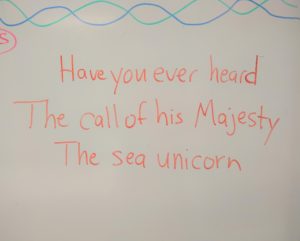By Dr. Jeff Howard
The other day I sat down at a table at work and, looking up, found someone had written a several poetic lines on a whiteboard near the window:

Based on everything I have know about English syntax, I would argue it was supposed to be a question, despite the deceptive absence of the appropriate punctuation mark. I can say the following with some certainty:
-
- It was a haiku. I can spot a haiku fairly quickly (I know I am not special in that regard), having read and taught haiku multiple times in composition courses. Sometimes haiku even show up in student work when I am not expecting them like pennies or long-lost relatives. Last semester, a student submitted a blog post following my exact specifications…with a singular addition: an elegaic haiku about an apple.
- Since it is poetry, I should forgive the unconventional non-punctuation.
- Who knew that narwhals sounded like that?
***
While working as a literary magazine editor, I saw haiku submissions all the time. We rarely published any. Most failed to advance past the poetry editors. These haiku were rigidly manacled to convention, at the cost of sense or music, struggling to transcend the form. They also have to deal with the stigma of accessibility and being “pop poetry,” which is always a point against a piece.
The only haiku that ever made it into the magazine actually consisted of a clutch of six haiku, called collectively “Haiku in Idaho.” They were submitted by a graduate student from Ireland, Séamus Ó Súilleabháin, who wrote them in Irish, translated them into English, and enlisted the help of a colleague from Japan, Junichi Ito, to translate them into Japanese. They looked beautiful on the page.
tráthnóna geimhridh winter evening 冬の晩
seabhac ag imeacht a hawk enters 鷹ぞはいぬ
faoi scáth an tsléibhe the mountain’s shadow 山の陰
***
Among the many poets who have taken up the haiku form, Matsuo Bashō, for many people, stands as the quintessential haiku artist. His poems, “The Old Pond” and others, are what we think of when the word haiku is mentioned.
The old pond,
A frog jumps in:
Plop!
~ trans. Allan Watts
Now, centuries removed from Bashō, the tradition of composing haiku continues, as evidenced by Jack Kerouac’s American Haiku and contemporary literary magazines like Acorn and Frogpond. I recently discovered a beaut by Kent Foreman, performed on Def Poetry Jam. The title is “Epiphany”:
The prolific haiku tradition, I would add, has also produced greeting cards and those anonymous haiku memes about refrigerators, which float through social media like paper lanterns.
Haikus are easy
But sometimes they don’t make sense
Refrigerator
Jeff Bond, a friend of mine from graduate school, has an annual February tradition of writing a daily haiku on social media. Here is a recent composition of about ice quakes, written February 2 of this year:
Cloudless tundra booms:
cryoseismic rumblings, or
frost giants snoring?
There is no one reason why the haiku tradition lives on in elite, popular, and folk culture, but I know what my reasons are for teaching haiku in my composition courses. Many are the potential benefits writing haiku can provide my students, whether through a full-fledged assignment or an in-class activity…or both. (Note: I say “both” because one could easily have a haiku day in which, rather than remain in their desks, students wander around campus or residence composing haikus, 1-2 of which they will then use as inspiration for a full-blown personal essay or other writing assignment.) Narrow focus, concision, careful diction, attention to detail: these are all conventions we associate with haiku. They are all principles of written communication I would like my students to transfer into their tool kits of composing.
The following linked sections describe experiences I have had with teaching haiku in first-year composition courses.
Works Cited
Bashō, Matsuo. “The Old Pond Poem.” Poem Hunter, n.d., https://www.poemhunter.com/poem/the-old-pond/. Accessed 06 Mar. 2019.
Bond, Jeff. “Cloudless Tundra.” Facebook, 02 Feb. 2019. Accessed 17 Feb. 2019.
Foreman, Kent. “Epiphany.” YouTube, uploaded by urbanrenewalprogram, 28 Aug. 2010, https://www.youtube.com/watch?v=Bbx997HasUQ.
Gross, Jordan. “Ketchup Writing/Haiku.” Received by Jeff Howard, 06 Feb. 2019.
“Haikus Are Easy.” Reddit, 29 Dec. 2017, https://www.reddit.com/r/OutOfTheLoop/comments/7mrr5e/whats_up_with_the_refrigerator_haikus/. Accessed 06 Mar. 2019.
“Jack Kerouac – American Haiku.” YouTube, uploaded by Gordon C
